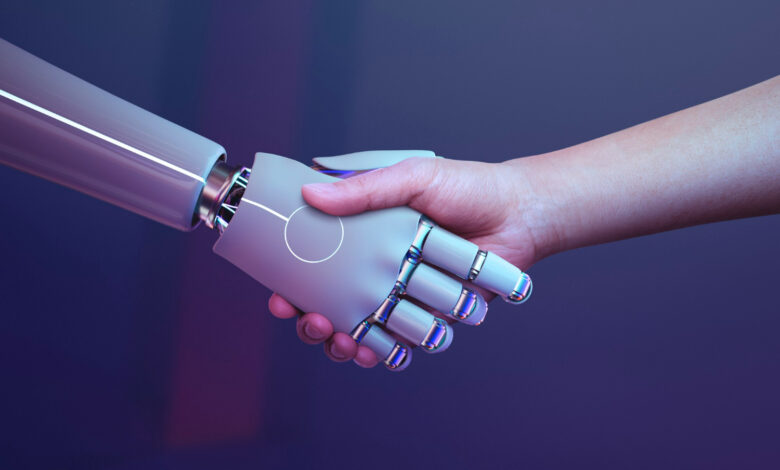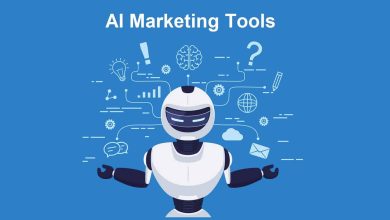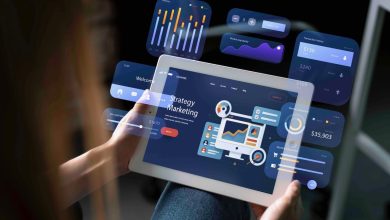
In just a few years, artificial intelligence has evolved from a futuristic concept into a fully fledged tool that businesses can’t afford to ignore. From creating personalised customer experiences and revolutionising decision-making, right through to increasing efficiency and acting as a reliable extra team member, AI is reshaping the marketing landscape at an incredible pace.
But, what exactly is driving this seismic shift, how are marketers actually using AI, what challenges are they facing while embracing it, and what does it mean for the future?
What’s Really Driving the Adoption of AI in Marketing?
In today’s fast-paced digital landscape, marketers need tools to keep up with evolving consumer behaviour and growing data complexity; and AI helps them do just that.
Its ability to rapidly process vast data sets helps marketers make sense of shifting trends and refine strategies in real-time. Just as importantly, its aptitude to automate tedious, time-consuming tasks allows marketers to focus on what truly drives impact – strategy, creativity, and high-level decision-making – as opposed to the smaller, more mundane, aspects of their roles.
But, beyond efficiency, AI is fueling innovation. Marketers can now experiment with new creative approaches, test strategies instantly, and execute highly targeted campaigns with unprecedented accuracy.
From content creation to customer insights, AI is reshaping every corner of marketing and transforming the way brands connect with their audiences.
How is AI Transforming Marketing Services?
The adoption of AI in marketing isn’t one-size-fits-all; it’s being applied in different ways across different marketing functions, spanning everything from PPC to customer service. Some of the marketing specialisms where it’s proven the most useful are in PPC, content, social media, email, and customer experience.
PPC (Pay-Per-Click)
In PPC, AI is being used to automate bid adjustments, refine audience targeting, and enhance ad relevance. By analysing user behaviour and market trends, AI ensures ads reach the most promising leads while maximising ROI. It also enables dynamic ad creation, tailoring content in real-time to boost conversions with minimal manual effort.
Content Marketing
AI streamlines content creation with natural language generation (NLG), producing high-quality articles, blogs, and product descriptions at scale. It enhances SEO by identifying relevant keywords and trends while AI-driven recommendation systems personalise content, increasing engagement and organic reach.
Social Media Marketing
AI powers social media strategies through trend analysis, sentiment tracking, and real-time audience engagement. It optimises post timing, content delivery, and even automates customer interactions via chatbots, improving response times and boosting engagement without extra manpower.
Customer Service and Support
Chatbots and virtual assistants that are powered by AI can handle routine inquiries, offering instant, personalised support while freeing up human agents for complex issues. With continuous learning, these tools improve over time, reducing costs and enhancing the overall customer experience.
Email Marketing
AI optimises email marketing by personalising content, predicting the best send times, and refining targeting. It automates segmentation and A/B testing, ensuring campaigns continuously improve and resonate with recipients, ultimately driving higher conversions.
While AI offers immense potential, integrating it into marketing strategies comes with its own set of challenges. In order to fully harness AI’s capabilities, marketers need to be aware of these challenges and consider how they address them.
What Challenges Are Marketers Facing When Integrating AI?
There are four main challenges facing marketers when it comes to adopting AI:
- Data Quality and Accuracy – AI is only as good as the data it processes. Outdated or incomplete information can lead to flawed insights, affecting everything from customer predictions to campaign performance. To stay effective, AI-driven strategies must be continuously monitored and refined.
- Bias and Ethical Concerns – Since AI learns from existing data, it can inadvertently reinforce biases, leading to exclusionary practices that damage brand reputation. Regular audits and greater transparency are essential to ensure fairness and maintain consumer trust.
- Transparency and Consumer Trust – Consumers expect to know when AI is being used in their interactions with brands. In fact, 78% say they want transparency from brands that use it. By openly communicating AI’s role and ensuring ethical data practices, marketers can build stronger relationships and trust with target consumers.
- Skill Gaps and Workforce Resistance – Some marketers are hesitant to fully leverage AI’s capabilities. However, this resistance often stems from a lack of understanding of how to use AI tools, and a fear it will replace them. To ease adoption, businesses must invest in training and position AI as a tool that enhances, rather than replaces, human creativity.
Predictions for AI in Marketing by 2030
By 2030, AI will be more deeply integrated into marketing, driving innovation while shaping new industry standards. As adoption grows, businesses will need to balance automation with human creativity, navigate evolving regulations, and address sustainability concerns, all while ensuring AI remains a tool for progress, not controversy.
Stronger regulations and ethical standards will be needed. As mentioned earlier, 78% of consumers want transparency around AI. So, brands will likely face stricter rules on data use, algorithmic fairness, and AI-driven decisions. Marketers should expect clearer guidelines on disclosing how and when AI is used, and how it influences customer interactions. This transparency will help ensure trust and accountability remain at the forefront.
There will be a push for more sustainable AI. As AI adoption increases, so will the focus on its environmental footprint. Data centres powering AI consume vast amounts of energy and water, with estimates suggesting AI infrastructure could use six times more water than Denmark. By 2030, businesses will need to invest in energy-efficient AI models and sustainable computing practices to align with eco-conscious expectations.
There will be increased focus on AI enhancing, not replacing, human creativity. While AI streamlines workflows, 72% of consumers want brands to limit AI adoption to protect human jobs. The future of AI in marketing isn’t about replacing creativity; it’s about supporting it. AI will help marketers refine ideas, personalise content, and optimise strategies, while human insight will ensure campaigns remain authentic and impactful.
AI will be more widely viewed as a strategic partner. AI’s role in decision-making will expand, helping businesses predict trends and optimise campaigns with greater precision. However, human judgment will remain essential, ensuring AI-driven insights align with brand values and evolving market dynamics.
Final Thoughts
AI is undeniably transforming the marketing landscape, offering marketers powerful tools to enhance personalisation, optimise strategies, and boost efficiency.
Looking ahead, the evolution of AI in marketing will be shaped by stricter regulations, environmental considerations, and a continued balance between automation and human creativity. Marketers who navigate these challenges thoughtfully will not only unlock the full potential of AI but also position their brands as forward-thinking, responsible, and aligned with consumer expectations.
In the coming years, the synergy between AI and human expertise will drive marketing innovation, pushing the boundaries of what’s possible while maintaining a human touch in an increasingly digital world.





